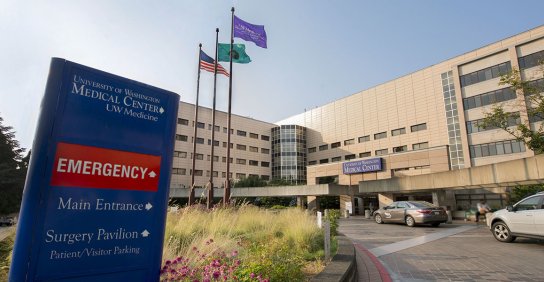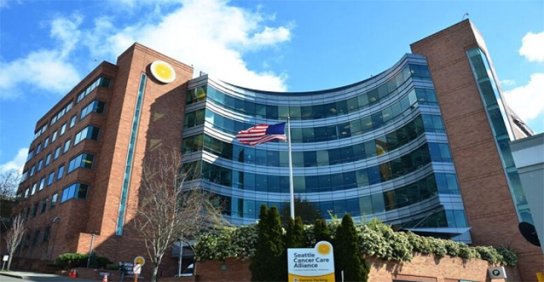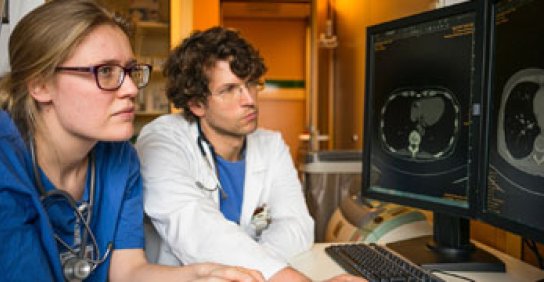For appointments, visit the Alvord Brain Tumor Center in the Pacific Tower, 7th Floor, UW Medical Center, 1959 NE Pacific St., Seattle, WA 98195
Brain Tumor Care
Our medical team, including nationally recognized cancer experts, offers complete care and support to people with brain tumors.
Brain Tumor Care
Our medical team, including nationally recognized cancer experts, offers complete care and support to people with brain tumors.

Expertise you can count on
Today, there are more treatment options for brain and spine tumors than ever before — even for advanced or hard-to-reach tumors. And these treatments, including proton therapy, Gamma Knife radiosurgery and minimally invasive skull-base surgery, are available at the Alvord Brain Tumor Center at UW Medicine.
No matter what kind of brain or spine tumor you have, our team can help. We treat tumors that are cancerous (malignant) and noncancerous (benign). We also treat tumors that start in the brain (primary brain tumors) or spread to the brain from another part of the body (metastatic or secondary brain tumors). We’ve helped many people with rare or aggressive tumors who thought they were out of options.
Specialists you can trust
The Alvord Brain Tumor Center is home to many leading experts, including neurologists, neurosurgeons, brain cancer specialists and researchers.
UW Medicine’s Alvord Brain Tumor Center offers world-class adult brain cancer treatment and research, through a unique relationship with Fred Hutchinson Cancer Center, an independent, nonprofit cancer care and research center that serves as UW Medicine’s cancer program. Fred Hutch is the only National Cancer Institute-designated cancer center in Washington.
Brain tumors we treat
There are more than 100 kinds of brain tumors, and it takes an experienced team to tell them apart and recommend the right treatments.
Most primary brain tumors are “gliomas,” meaning they start in a type of cell found throughout the nervous system (glial cells). Metastatic tumors can start in any part of the body before spreading to the brain.
We can diagnose and treat any primary or metastatic tumor, including:
Acoustic neuroma
Also known as vestibular schwannomas, these noncancerous tumors grow on the nerve that connects your inner ear to your brain. As they grow, they can cause balance problems, dizziness and hearing loss.
Glioma
Tumors that start in the glial cells, which help your brain’s nerve cells work properly, can affect memory, mood, speech and vision. Types of gliomas include astrocytomas, ependymomas and oligodendrogliomas.
Pituitary tumor
Tumors that grow on (or press against) the pituitary gland can cause hormone-related conditions such as Cushing’s disease and acromegaly. They often require care from both a neurosurgeon and an endocrinologist.
Meningioma
Meningioma is a primary brain tumor. Most are benign and slow growing. Some, though, are malignant and aggressive. Surgery is usually the first treatment for meningiomas that grow and cause symptoms.
Glioblastoma
Glioblastoma is a cancerous brain tumor in adults. It grows and spreads quickly, causing symptoms like headaches, seizures and blurred vision. Treatments help slow its growth and reduce symptoms.
UW Medicine Alvord Brain Tumor Center

UW Medical Center - Montlake

Brain and Spine Metastases Clinic at Fred Hutch
For appointments, visit Fred Hutchinson Cancer Center at South Lake Union, 1354 Aloha St., Seattle, WA 98109
Innovative treatments and services we offer
Our care team will guide you along the way as you receive the best cancer care in the Northwest. As part of the Fred Hutchinson Cancer Center, our cancer care services offer the latest treatments, including:
-
Chemotherapy
-
Endoscopic skull-base surgery
-
Gamma knife radiosurgery
-
Immunotherapies
-
Laser interstitial thermal therapy
-
Minimally invasive brain surgery
-
Optune for glioblastoma
-
Targeted therapies
-
Proton therapy
-
Whole-brain radiation therapy
Patient resources and support

MyChart patient portal
Schedule and manage appointments, pay bills and see test results with MyChart, our online patient portal.

Clinical trials
Our patients have access to new, experimental treatments for brain and spine tumors.